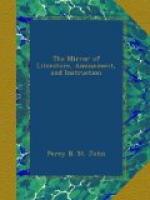A CONSTANT READER.
“I shandy it away fifty times more than I was ever wont, talk more nonsense than ever you heard me talk in your days—and to all sorts of people. Qui le diable est cet homme la ... said Choiseul, t’other day. You’ll think me as vain as a devil, was I to tell you the rest of the dialogue.... The Duke of Orleans has suffered my portrait to be added to the number of some odd men in his collection; and a gentleman who lives with him has taken it most expressively, at full length. I purpose to obtain an etching of it, and to send it to you.”
* * * * *
EPITOME OF THE ANCIENT KINGDOM OF POLAND.
(For the Mirror.)
Poland was once the country of the Vandals, who left it to invade the Roman Empire. The kingdom began, by favour of Otho III., Emperor of Germany, under Boleslaus, 999; Red Russia was added to it in 1059; Pomerania, that had been separated 180 years, again united with it, 1465; embraced Christianity, 965; the order of the White Eagle instituted in 1705. The peasants in Poland were serfs or slaves, and the value of an estate was not estimated from its extent, but from the number of the peasants who were transferred, like cattle, from one master to another. The first person who granted freedom to his peasants was Zamoiski, formerly grand chancellor, who in 1760 enfranchised six villages. The Jews were first introduced into Poland about the time of Casimir the Great; they were indulged with great privileges, and became so numerous that Poland was styled the Paradise of the Jews. So late as the thirteenth century, the Poles retained the custom of killing old men when past their labour, and such children as were born imperfect. “The natural strength of Poland, if properly exerted, (says a modern writer) would have formed a more certain bulwark against the ambition of her neighbours than the faith of treaties;” and it is worthy of remark, that of the three partitioning powers, Prussia was formerly in a state of vassalage to the republic; Russia once saw her capital and throne possessed by the Poles, under Sigismund III. whose troops got possession of Moscow, and whose son, Ladislaus, was chosen Great Duke of Muscovy, by a party of the Russian nobles; and Austria was indebted to John Sobieski, King of Poland, who, in 1683, compelled the Turks to raise the siege of Vienna, and delivered the house of Austria from the greatest dangers it ever experienced.
“The partition of Poland (says Mr. Coxe,) was first projected by the King of Prussia.”
In 1794, Suwarof laid siege to Praga, a fortified suburb of Warsaw, and carried it by assault, with a tremendous carnage. The king was compelled to abdicate, and the whole country was incorporated in the dominion of Russia, Prussia, and Austria.
Early in 1797 Stanislaus arrived at Petersburg, and, according to the appointment of the sovereign, fixed his residence in the Marble Palace, on the banks of the Neva; but his death, which happened on the 12th of February, 1798, terminated the series of Polish sovereigns:




